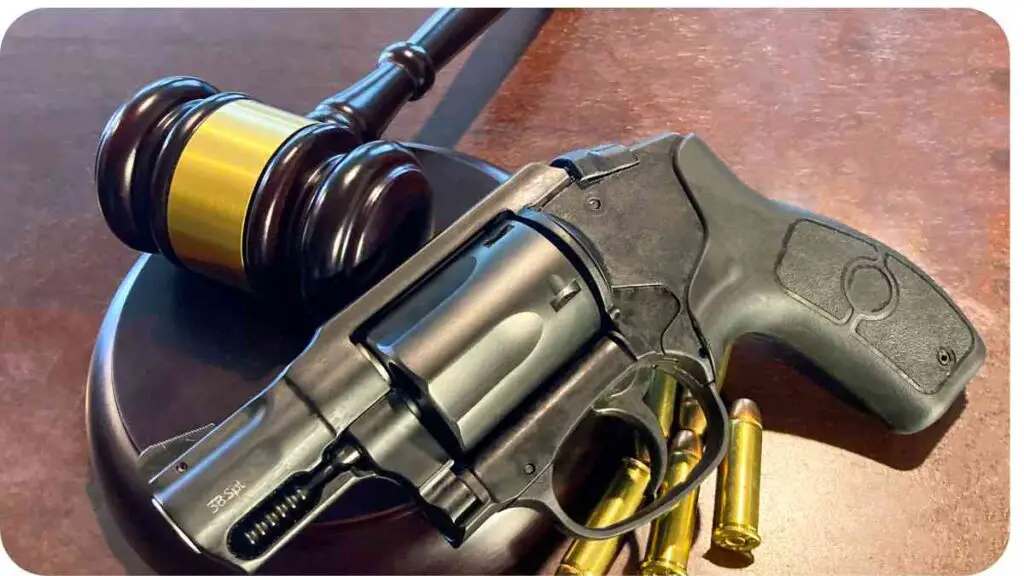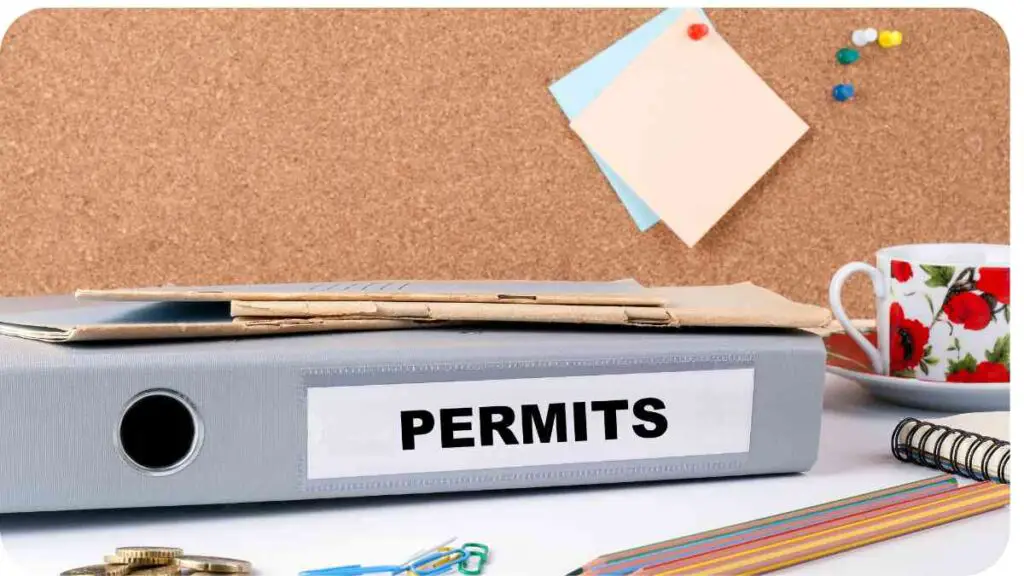Can I carry my gun in my front yard? It’s a common question for gun owners who want to ensure they are following the law while protecting their property. Understanding the nuances of gun laws, especially regarding carrying on your property, can be complex and varies greatly depending on where you live.
This article will guide you through the key aspects of carrying a gun in your front yard, including legal considerations, safety tips, and expert advice.
| Key Takeaways |
|---|
| Understanding federal, state, and local gun laws is crucial for legally carrying a firearm. |
| Homeowners generally have the right to carry firearms on their property, including the front yard. |
| Tenants’ rights to carry firearms may depend on state laws and lease agreements. |
| Open carry and concealed carry regulations vary widely by state and locality. |
| The Castle Doctrine and Stand Your Ground laws influence the legal use of firearms in self-defense. |
| Safe gun handling and proper storage are essential to prevent accidents and unauthorized access. |
| Training and obtaining necessary permits enhance safety and legal compliance. |
| Insurance considerations are important for protecting against potential liabilities. |
| Open communication with neighbors can help prevent misunderstandings and foster community support. |
| Real-life case studies and expert opinions provide valuable insights into practical scenarios. |
Understanding Gun Laws

Federal Gun Laws
Federal gun laws set the groundwork for what is legally acceptable regarding firearm ownership and use in the United States. These laws, governed by the Bureau of Alcohol, Tobacco, Firearms, and Explosives (ATF), cover aspects like background checks, prohibited persons, and interstate firearm transfers. However, federal laws do not typically address the specifics of carrying firearms on private property, which is left to state and local jurisdictions.
Carrying a firearm is a serious matter, and understanding the local laws is crucial. Learn more about open carry in your front yard to avoid any legal issues.
State Gun Laws
State laws are where the details about carrying a gun on your property get more specific. Each state has its regulations, and these can vary widely. For example, some states have stringent licensing requirements, while others may have more relaxed rules about carrying firearms in public and private spaces. It’s crucial to familiarize yourself with your state’s specific laws to ensure compliance.
Carrying Guns on Private Property
Homeowner Rights
As a homeowner, you generally have the right to carry a firearm on your property, including your front yard. This right is often rooted in state laws that recognize the property owner’s ability to protect themselves and their property. However, there may be restrictions based on local ordinances or homeowners’ association rules.
Tenant Rights
For tenants, the right to carry a firearm in their front yard can be more complicated. It often depends on the lease agreement and state laws regarding tenant rights. Some states have laws that protect a tenant’s right to possess firearms, while others may defer to the property owner’s policies.
Open Carry vs. Concealed Carry

Differences Between Open and Concealed Carry
Open carry refers to carrying a firearm visibly, while concealed carry means the firearm is hidden from view. The legality of each varies by state and local jurisdiction. Understanding the differences is crucial for determining what is allowed in your front yard.
Did you know that living in your front yard could be illegal in some areas? Check out this guide to learn more about the regulations in your area.
Which is Legal in Your Yard?
Whether you can open carry or concealed carry in your front yard depends on state laws and local regulations. In some areas, open carry is permitted without a permit, while concealed carry may require one. Always check your local laws to avoid potential legal issues.
Castle Doctrine and Stand Your Ground Laws
What is Castle Doctrine?
The Castle Doctrine is a legal principle that allows individuals to use reasonable force, including deadly force, to protect themselves against an intruder in their home. This doctrine can extend to your front yard, depending on state laws, and provides legal justification for using a firearm in self-defense on your property.
What are Stand Your Ground Laws?
Stand Your Ground laws expand the principles of the Castle Doctrine beyond the home, allowing individuals to use force
without the duty to retreat when they reasonably believe it is necessary to defend against an imminent threat. These laws vary by state, and knowing whether your state has such provisions can impact your legal standing when carrying a firearm in your front yard.
Local Ordinances and Restrictions
Local ordinances can impose additional restrictions on carrying firearms, even on private property. These regulations can include prohibitions on discharging firearms within city limits, noise ordinances, or specific rules about carrying firearms in residential areas. Always consult your local government or a legal expert to understand these rules.
Interactions with Law Enforcement
Best Practices
When carrying a gun in your front yard, it’s essential to be prepared for potential interactions with law enforcement. Always keep your identification and any relevant permits readily accessible. If approached by police, remain calm, keep your hands visible, and clearly communicate your actions. Respectful cooperation can help avoid misunderstandings and de-escalate any tension.
What to Expect
Law enforcement officers may respond to calls about a person with a gun, even if you are legally carrying it on your property. They will likely inquire about your intentions and check for compliance with local laws. Understanding your rights and obligations can help ensure these interactions go smoothly.
Parking your car in your front yard might not be as straightforward as you think. Discover the rules and regulations with this helpful guide.
Self-Defense Scenarios
When is it Legal to Use Your Gun?
The legality of using your gun in self-defense depends on several factors, including the presence of an imminent threat, your state’s self-defense laws, and the specifics of the situation. Generally, you must reasonably believe that force is necessary to prevent death or serious bodily harm.
Legal Consequences
Using a firearm in self-defense can lead to legal scrutiny, even if you believe your actions were justified. Potential consequences include criminal charges, civil lawsuits, and legal costs. It is crucial to understand the laws and seek legal counsel if you are involved in a self-defense incident.
Gun Safety Tips
Safe Handling Practices
Proper gun handling is crucial for preventing accidents and ensuring safety. Always treat every firearm as if it is loaded, keep your finger off the trigger until ready to shoot, and never point the gun at anything you do not intend to destroy. Regularly practice these habits to maintain safe handling skills.
Storing Your Gun Safely
Safe storage is essential to prevent unauthorized access and accidents. Use gun safes, lockboxes, or other secure storage methods, and ensure that firearms are unloaded when not in use. Additionally, educate household members about firearm safety.
Training and Permits

Obtaining a Permit
If your state requires a permit to carry a firearm, ensure you understand the application process, eligibility criteria, and renewal requirements. Obtaining a permit typically involves background checks, fingerprinting, and possibly completing a firearm safety course.
Adding a trampoline to your front yard can be a great source of entertainment, but is it allowed? Find out with this informative article.
Training Programs
Participating in training programs enhances your skills and knowledge about firearms. Look for courses that cover basic firearm safety, defensive shooting, and legal aspects of gun ownership. Regular training can improve your confidence and preparedness in handling firearms responsibly.
Insurance Considerations
Carrying a firearm can have insurance implications. Homeowner’s insurance policies may cover certain incidents involving firearms, but additional liability insurance might be necessary. Review your policy and consider supplemental coverage to protect against potential legal and financial repercussions.
Neighbors and Community Relations
Communicating with Neighbors
Open communication with neighbors about your intent to carry a firearm on your property can help alleviate concerns and prevent misunderstandings. Explain your reasons and reassure them about your commitment to safety. Building a positive relationship with your neighbors fosters a supportive community environment.
Community Watch Programs
Joining or starting a community watch program can enhance neighborhood safety and provide a platform for discussing concerns and best practices regarding firearms. Collaborative efforts with neighbors can lead to a more secure and informed community.
Case Studies
Real-Life Examples
Examining real-life examples of individuals who have carried firearms on their property provides valuable insights into potential scenarios and outcomes. These case studies can highlight the challenges, legal battles, and resolutions faced by others in similar situations.
Lessons Learned
Learning from the experiences of others can help you avoid common pitfalls and make informed decisions about carrying a firearm in your front yard. Analyze the successes and mistakes in these cases to apply best practices to your circumstances.
Building a garage in your front garden can add value to your home, but it’s important to know the regulations. Read more about it in Can You Build a Garage in the Front Garden?
Expert Opinions
Interviews with Legal Experts
Seeking advice from legal experts can clarify the complexities of firearm laws and self-defense rights. Interviews with attorneys specializing in gun laws provide authoritative insights and practical tips for navigating the legal landscape of carrying a firearm on your property.
Views from Gun Rights Advocates
Gun rights advocates offer perspectives on the importance of the Second Amendment, self-defense rights, and responsible gun ownership. Their viewpoints can shed light on the broader context of gun laws and personal protection.
Federal Gun Laws
Federal gun laws form the foundation of firearm regulation in the United States. These laws establish the basic framework for who can legally own firearms, how firearms can be sold and transferred, and certain restrictions on firearm types and features.
Key Federal Gun Laws
| Law Name | Description |
|---|---|
| Gun Control Act (GCA) of 1968 | Regulates firearm commerce, prohibits certain individuals from owning guns. |
| Brady Handgun Violence Prevention Act | Mandates background checks for firearm purchasers. |
| National Firearms Act (NFA) of 1934 | Regulates specific types of firearms, such as machine guns and suppressors. |
Understanding these federal laws is essential, as they apply universally across all states, setting the baseline for firearm ownership and transfer.
State Gun Laws
State gun laws provide more detailed regulations on firearm possession, carry, and use. These laws can vary significantly from state to state, affecting where, how, and who can carry firearms, including on private property.
Examples of State Gun Laws
| State | Open Carry Regulations | Concealed Carry Regulations | Stand Your Ground Law |
|---|---|---|---|
| Texas | Allowed without a permit | Requires a license to carry | Yes |
| California | Prohibited in most public places | Requires a permit issued by local authorities | No |
| Florida | Allowed with some restrictions | Requires a concealed weapon license | Yes |
| New York | Highly restricted | Requires a permit, very stringent process | No |
Understanding your state’s specific laws is crucial for ensuring you comply with local regulations when carrying a gun in your front yard.
Carrying Guns on Private Property
Homeowner Rights
As a homeowner, you generally have the right to carry a firearm on your property, including your front yard. This right stems from the principle that you can defend yourself and your property. However, certain conditions and local regulations might apply. For example, if you live in a densely populated area or a community with strict homeowners’ association (HOA) rules, additional restrictions may be in place.
Tenant Rights
For tenants, the situation can be more complex. The right to carry a firearm in your rented front yard often depends on state laws and lease agreements. Some states have laws protecting tenants’ rights to possess firearms, while others may allow landlords to impose restrictions. Always review your lease and state laws to understand your rights fully.
Open Carry vs. Concealed Carry
Differences Between Open and Concealed Carry
Open carry means that your firearm is visibly worn on your person, whereas concealed carry means the firearm is hidden from view, typically under clothing. The legality of each can vary by state and local regulations. Open carry is often more heavily regulated in urban areas, while rural areas might have fewer restrictions.
Which is Legal in Your Yard?
Whether you can open carry or concealed carry in your front yard depends on your state’s laws and local ordinances. Some states allow open carry without a permit, but concealed carry generally requires a permit. Always verify your state and local laws to ensure you are in compliance when carrying a firearm on your property.
Castle Doctrine and Stand Your Ground Laws
What is Castle Doctrine?
The Castle Doctrine is a legal doctrine that gives people the right to use reasonable force, including deadly force, to defend themselves against an intruder in their home. This principle often extends to the yard surrounding the home, allowing homeowners to protect their property and themselves without the duty to retreat.
What are Stand Your Ground Laws?
Stand Your Ground laws remove the duty to retreat before using force in self-defense in any place where a person has a legal right to be. This means that if you are in your front yard and face an imminent threat, you may use force to defend yourself without first attempting to retreat, depending on your state’s laws.
Local Ordinances and Restrictions
Local ordinances can further regulate where and how you can carry a firearm, even on your private property. These regulations may include prohibitions on discharging firearms within city limits, noise ordinances, or specific rules about displaying firearms in residential areas.
Checking Local Regulations
It is crucial to check with your local government or a legal expert to understand any additional restrictions that may apply in your area. Compliance with local laws ensures you avoid potential legal issues.
Interactions with Law Enforcement
Best Practices
When carrying a firearm in your front yard, it’s essential to be prepared for potential interactions with law enforcement. Keep your identification and any relevant permits readily accessible. If approached by police, remain calm, keep your hands visible, and clearly communicate your actions. Respectful cooperation can help avoid misunderstandings and de-escalate any tension.
What to Expect
Law enforcement officers may respond to calls about a person with a gun, even if you are legally carrying it on your property. They will likely inquire about your intentions and check for compliance with local laws. Understanding your rights and obligations can help ensure these interactions go smoothly.
Self-Defense Scenarios
When is it Legal to Use Your Gun?
The legality of using your gun in self-defense depends on several factors, including the presence of an imminent threat, your state’s self-defense laws, and the specifics of the situation. Generally, you must reasonably believe that force is necessary to prevent death or serious bodily harm.
Legal Consequences
Using a firearm in self-defense can lead to legal scrutiny, even if you believe your actions were justified. Potential consequences include criminal charges, civil lawsuits, and legal costs. It is crucial to understand the laws and seek legal counsel if you are involved in a self-defense incident.
Gun
Gun Safety Tips
Safe Handling Practices
Proper gun handling is essential to prevent accidents and ensure safety. Always treat every firearm as if it is loaded, keep your finger off the trigger until ready to shoot, and never point the gun at anything you do not intend to destroy. Regular practice of these habits is vital to maintaining safe handling skills.
Storing Your Gun Safely
Safe storage of firearms prevents unauthorized access and accidents. Use gun safes, lockboxes, or other secure storage methods, and ensure that firearms are unloaded when not in use. Additionally, educate household members about firearm safety and the importance of proper storage.
| Safe Storage Methods | Description |
|---|---|
| Gun Safe | A secure, locked container for firearms |
| Lockbox | A smaller, portable option for securing handguns |
| Cable Lock | A lock that goes through the firearm to prevent use |
| Biometric Safe | A safe that uses fingerprint recognition for access |
Training and Permits
Obtaining a Permit
If your state requires a permit to carry a firearm, understanding the application process, eligibility criteria, and renewal requirements is crucial. Obtaining a permit typically involves background checks, fingerprinting, and completing a firearm safety course.
Training Programs
Participating in training programs enhances your skills and knowledge about firearms. Look for courses that cover basic firearm safety, defensive shooting, and legal aspects of gun ownership. Regular training can improve your confidence and preparedness in handling firearms responsibly.
| Training Program Type | Description |
|---|---|
| Basic Firearm Safety | Covers fundamentals of gun safety and handling |
| Defensive Shooting | Focuses on using firearms for self-defense |
| Legal Aspects of Gun Ownership | Provides knowledge on laws and regulations |
| Advanced Tactics | Offers training on advanced firearm handling skills |
Insurance Considerations
Carrying a firearm can have insurance implications. Homeowner’s insurance policies may cover certain incidents involving firearms, but additional liability insurance might be necessary. Review your policy and consider supplemental coverage to protect against potential legal and financial repercussions.
| Insurance Type | Coverage |
|---|---|
| Homeowner’s Insurance | May cover accidents or damages involving firearms |
| Liability Insurance | Provides additional coverage for firearm-related incidents |
| Personal Umbrella Policy | Offers broader protection for various liabilities |
Neighbors and Community Relations
Communicating with Neighbors
Open communication with neighbors about your intent to carry a firearm on your property can help alleviate concerns and prevent misunderstandings. Explain your reasons and reassure them about your commitment to safety. Building a positive relationship with your neighbors fosters a supportive community environment.
Community Watch Programs
Joining or starting a community watch program can enhance neighborhood safety and provide a platform for discussing concerns and best practices regarding firearms. Collaborative efforts with neighbors can lead to a more secure and informed community.
Case Studies
Real-Life Examples
Examining real-life examples of individuals who have carried firearms on their property provides valuable insights into potential scenarios and outcomes. These case studies can highlight the challenges, legal battles, and resolutions faced by others in similar situations.
| Case Study | Description |
|---|---|
| Homeowner Defense | An example where a homeowner used a firearm for protection |
| Legal Battle | A case involving legal consequences of carrying a firearm |
| Community Response | How a neighborhood reacted to a resident carrying a firearm |
Lessons Learned
Learning from the experiences of others can help you avoid common pitfalls and make informed decisions about carrying a firearm in your front yard. Analyze the successes and mistakes in these cases to apply best practices to your circumstances.
Expert Opinions
Interviews with Legal Experts
Seeking advice from legal experts can clarify the complexities of firearm laws and self-defense rights. Interviews with attorneys specializing in gun laws provide authoritative insights and practical tips for navigating the legal landscape of carrying a firearm on your property.
Views from Gun Rights Advocates
Gun rights advocates offer perspectives on the importance of the Second Amendment, self-defense rights, and responsible gun ownership. Their viewpoints can shed light on the broader context of gun laws and personal protection.
Conclusion
Carrying a firearm in your front yard involves understanding a complex web of federal, state, and local laws, along with practical considerations for safety and community relations. By staying informed and following best practices, you can ensure that you are prepared to responsibly exercise your rights while protecting yourself and your property.
Further Reading
For those interested in delving deeper into the topic of carrying firearms on private property, the following resources provide additional insights and information:
- The Yard Gun – An article from USCCA discussing the considerations and best practices for carrying a firearm in your yard.
- Concealed Carry in Your Front Yard: Oregon Laws – A discussion thread on Northwest Firearms about the specific regulations in Oregon regarding carrying concealed firearms in your front yard.
- Pennsylvania Firearm Owners Association Forum – A forum thread where Pennsylvania residents discuss the legalities and personal experiences of carrying firearms in their front yards.
FAQs
Can I legally carry my gun in my front yard?
Yes, in most cases, you can legally carry a firearm in your front yard. However, the specific regulations depend on state and local laws. Always check your local regulations to ensure compliance.
Do I need a permit to carry a gun in my front yard?
The requirement for a permit to carry a firearm in your front yard varies by state. Some states allow open carry without a permit, while others require a permit for both open and concealed carry. Verify your state’s laws to determine what is necessary.
What should I do if law enforcement approaches me while carrying a gun in my front yard?
If approached by law enforcement, remain calm, keep your hands visible, and clearly communicate your actions. It is also advisable to have your identification and any relevant permits readily accessible. Cooperation and respectful communication can help avoid misunderstandings.
Are there any local ordinances that could affect my ability to carry a gun in my front yard?
Yes, local ordinances can impose additional restrictions on carrying firearms, even on private property. These might include prohibitions on discharging firearms within city limits or specific rules about displaying firearms. Always check with your local government for any applicable regulations.
What are the legal consequences of using my gun in self-defense in my front yard?
Using a firearm in self-defense can lead to legal scrutiny, even if you believe your actions were justified. Potential consequences include criminal charges, civil lawsuits, and legal costs. Understanding your state’s self-defense laws and seeking legal counsel in such situations is crucial.

Hi! My name is Hellen James, and I’m here to help you with your home-maintenance needs. Whether it’s building a better yard or just trying to fix a garden—I can show you how.


